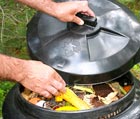- Gardening Tips |
- | What's NEW! |
- | Contact Us |
- | Sitemap
To Mulch or Not to Mulch...
That is the Question
Whether to mulch or not to mulch a garden area is sometimes a decision gardeners need to make.
At first, it may seem best to mulch every part of a garden that is bare of flowers or plants.
After all, gardeners know that mulching the garden can be quite beneficial.
Mulching helps to insulate the garden soil from temperature extremes.
Mulching also helps to retain and preserve moisture around plants, helps to suppress weeds, and helps prevent soil erosion.
Using an organic material as mulch can have an additional benefit. Organic matter breaks down easily or decomposes. This decayed matter can be full of nutrients for the soil.
Plants in the garden naturally use up valuable nutrients in the soil during the growing season. The use of organic mulches and composting can help to enrich the soil by replacing some of those nutrients.
This can thus help the soil remain healthier for a longer period of time.
Also, consider the location of the garden site. If the garden area is one that naturally stays moist, there may be little need to mulch.
It may be more beneficial to leave the ground exposed to the sunlight. Most plants need dry periods in between the moist spells in order to fully complete their growing cycles.
It's true that most plants benefit greatly from the use of mulch.
New bulbs, like tulips, do best after planting when covered with a layer of mulch.
The mulch helps keep the soil from going through extreme freeze-thaw conditions during cold winter months. Mulching helps prevent the bulbs from being severely pushed up and down or being heaved from the ground.
Another group of plants, ornamental grasses, prefer to be mulched, also. Mulching helps maintain moisture levels and soil temperature. Thus, mulching can prevent the root systems of ornamental grasses from being exposed to excessive cold or heat.
Sometimes, though, it may be better to leave the soil around the plants completely bare. Avoiding the use of mulch altogether may actually be in the best interest of the plant.
Iris is a good example. Iris is a plant that loves to bask in the sunlight with its rhizomes almost completely uncovered. In order to produce blooms each season, Iris is actually dependent upon the sunlight baking the rhizomes for a good portion of the day.
Then there are plants that may or may not benefit from mulching. Hosta is one of those plants.
For some hosta, mulching can be troublesome. Mulches can provide the moist, dark places which provide a perfect hiding place for slugs and snails.
These particular garden pests can be rather problematic for hosta. On the other hand, for some hosta, a layer of mulch could prove perfectly harmless.
In fact, it may even be helpful over the winter in order to help keep the hosta roots from becoming heaved and ultimately exposed during freeze-thaw periods.
So as you can see, the decision as to whether or not to mulch a garden area may not be so cut and dry. When deciding whether to mulch or not, sometimes the decision may be location or plant specific.
Thinking about these things can help you decide whether to mulch or not to mulch a garden area.
More Gardening Articles
To Top of this To Mulch or Not page
Return to Gardening Tips Home Page
Gardening Updates
Note: We'd love you to send us your favorite garden pics to feature on our new pages!
Contact Us and we'll send you an email address that can accommodate your photographs.

